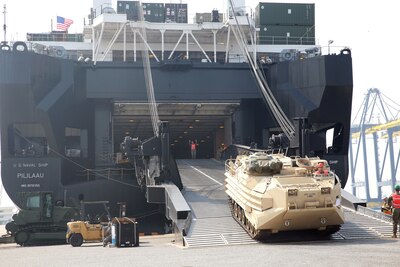By Grady Fontana, Military Sealift Command Far East
LAEM CHABANG, Thailand, Feb. 10, 2018 — Military Sealift
Command’s maritime pre-positioning ship USNS Pililaau arrived at the port here
Feb. 5 and offloaded equipment marked for various locations in Thailand to
support Exercise Cobra Gold 2018.
Cobra Gold 2018 is a Thailand and United States co-sponsored
exercise conducted annually in Thailand.
The Pililaau, a large, medium-speed, roll-on/roll-off
platform, was the first of three ships to arrive and offload equipment for this
year’s Cobra Gold. The other vessels were operated under a U.S. Army Pacific
contract to deliver additional equipment.
“We originated from Saipan, traveled to [the Japanese island
of] Okinawa and picked up the offload preparation party Marines, then traveled
to Thailand for the discharge of equipment,” said civilian mariner Capt. Thomas
P. Madden, master of the USNS Pililaau. Over the course of about three days,
the Marines and the ship’s crew discharged about 265 pieces of gear from the
Pililaau.
Pre-Positioning Ships
The USNS Pililaau is part of Maritime Prepositioning Ships
Squadron 3, a fleet of government-owned ships operated by Military Sealift
Command and based in the Guam-Saipan area of the western Pacific Ocean.
In addition, a second fleet, Maritime Prepositioning Ships
Squadron 2, based out of Diego Garcia in the Indian Ocean, delivers a strategic
power-projection capability for the Marine Corps, Army and Air Force. Maritime
pre-positioning ships deliver a forward presence and rapid crisis response
capability by delivering equipment and supplies to various locations at sea.
“Put together a few of these ships, and you can sustain
[15,000 to 18,000] Marines for 30 days -- everything from fuel, food, water,
the whole nine yards,” Madden said. “With this program, your footprint is a lot
less.”
Unconventional Logistics Operations
Aside from the common pierside offloads, the Pililaau can
also function during unconventional logistics operations such as in a seabasing
scenario, when cargo is discharged from ship to shore while at sea. In a
seabasing operation, cargo is transferred offshore through an in-stream
offload. Offloaded equipment and supplies are then connected with the Marines
and sailors staged at nearby land bases.
“It’s terrific if you can come into a port to offload cargo,
but if those ports are contested or not available, these ships have the
capability to anchor off and discharge cargo,” Madden said. “By marrying up
with an [expeditionary transfer dock and air-cushioned landing craft], we’re
able to do a little bit more over-the-horizon logistics and discharge cargo at
sea.”
Meeting Combatant Commanders’ Needs
The Maritime Prepositioning Force is scalable to meet the
needs of the geographical combatant commanders, or can support exercises such
as Cobra Gold with one large, medium-speed, roll-on/roll-off platform.
“If we were to discharge the entire ship, we could fill
eight football fields,” Madden said. “With enough drivers, this vessel can
offload all the [roll-on/roll-off] cargo in less than 24 hours.”
However, only select items were required for Cobra Gold
2018. Some of it lay deep in the cargo decks of the Pililaau.
“This involved an offload and backload of a number of
[additional] vehicles in order to get to the specific items that the Marines
needed,” said Navy Lt. j.g. Will Contarino, Maritime Prepositioning Ships
Squadron 3 supply officer. As a result, he added, the offload took the offload
preparation party three days to complete.
Contarino is serving as his squadron’s liaison officer
during Cobra Gold, representing Military Sealift Command as the link between
the ship’s crew and the Marines.
After the discharge operation, the Pililaau moved to a site
off the coast of Thailand and will remain there until Cobra Gold 2018 ends. The
ship will then return to port and reload the equipment before embarking on in
next assignment.
Exercise Cobra Gold, in its 37th iteration, is designed to
advance regional security and ensure effective responses to regional crises by
bringing together a robust multinational force to address shared goals and
security commitments in the Indo-Pacific region.
Military Sealift Command operates some 115 noncombatant,
civilian-crewed ships that replenish U.S. Navy ships, conduct specialized
missions, strategically pre-position combat cargo at sea around the world and
move military cargo and supplies used by deployed U.S. forces and coalition partners.









